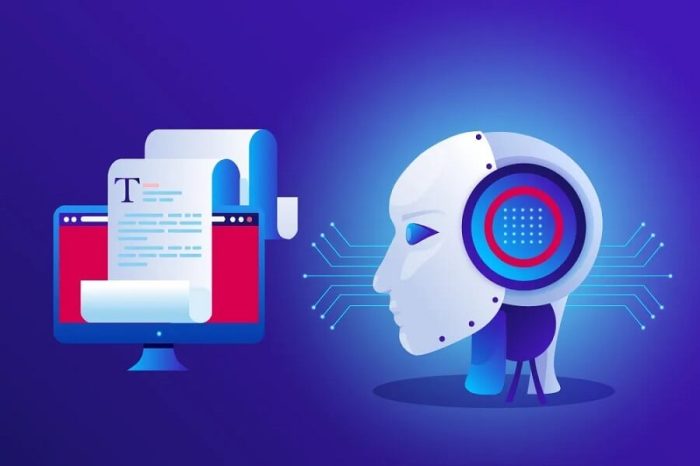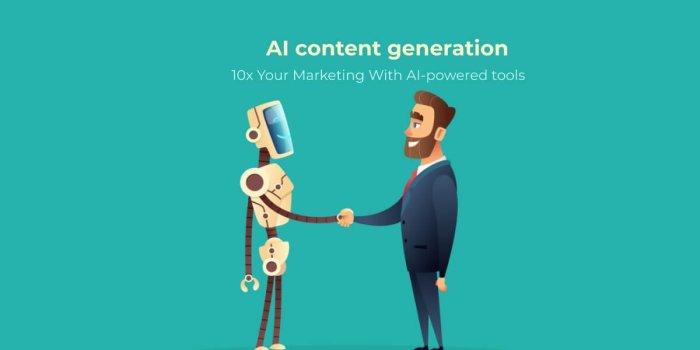Using AI for Content Creation introduces a new wave of innovation in the world of creative processes. From generating written content to optimizing , AI is reshaping how we approach content creation. Let’s dive into the technological marvel that is AI in content creation.
In this article, we will explore the various applications of AI in content creation, the tools and software available, ethical considerations, and more. Get ready to uncover the future of content creation with AI!
Introduction to AI for Content Creation

Artificial Intelligence (AI) in the context of content creation refers to the use of advanced algorithms and machine learning techniques to generate, curate, and optimize content for various platforms and mediums.
Role of AI in Revolutionizing Content Creation
AI has revolutionized content creation processes by automating tasks that were previously time-consuming and labor-intensive. It can analyze data, predict trends, personalize content, and improve overall efficiency in content production.
Benefits of Using AI for Content Creation
- Efficiency: AI can automate repetitive tasks such as research, data analysis, and content optimization, allowing creators to focus on more creative aspects of content creation.
- Personalization: AI can analyze user behavior and preferences to deliver personalized content recommendations, increasing engagement and conversion rates.
- Scalability: AI can handle large volumes of content creation and distribution, making it easier to reach a wider audience in less time.
- Quality: AI tools can help maintain consistency and quality standards in content production, ensuring that content meets the desired standards.
Applications of AI in Content Creation
AI plays a crucial role in various aspects of content creation, revolutionizing the way we generate and optimize content for different platforms. Let’s delve into how AI is utilized in creating written content, visual content, and optimizing content for purposes.
Generating Written Content
AI has been increasingly used to generate written content efficiently and effectively. Through natural language processing (NLP) algorithms, AI can analyze vast amounts of data, understand context, and create high-quality written content. This technology is particularly beneficial for tasks like writing product descriptions, news articles, social media posts, and even blog posts. AI-powered tools can help writers generate content faster, improve readability, and ensure consistency in tone and style.
Creating Visual Content
In addition to written content, AI is also transforming the creation of visual content such as images and videos. AI algorithms can generate images, graphics, and videos based on specific criteria or user input. For example, AI-powered tools can automatically create personalized images for social media posts, design logos, or even generate video clips. This not only saves time for content creators but also ensures a high level of customization and creativity in visual content production.
Optimizing Content for
AI plays a crucial role in optimizing content for search engine optimization () purposes. AI algorithms can analyze s, trends, and user behavior to help content creators optimize their content for better search engine rankings. AI-powered tools can suggest relevant s, analyze competitors’ strategies, and even predict future trends to help content creators tailor their content for maximum visibility and engagement.
This ensures that content is not only well-crafted but also strategically optimized for reaching the target audience effectively.
Tools and Software for AI Content Creation

When it comes to AI-powered tools for generating written content, there are several popular options available in the market. These tools use artificial intelligence algorithms to generate high-quality content quickly and efficiently.
Popular AI-powered tools for generating written content:
- 1. OpenAI’s GPT-3: Known for its natural language processing capabilities, GPT-3 can generate human-like text based on the input provided.
- 2. ShortlyAI: This tool uses AI to help writers create content by providing suggestions and completing sentences.
- 3. Writesonic: Utilizing AI, Writesonic can generate blog posts, social media content, and more with just a few prompts.
- 4. Copy.ai: Copy.ai is a versatile tool that can assist with various types of content creation, including ad copy, blog posts, and product descriptions.
Different software options for creating visual content using AI:
- 1. Canva: While not solely AI-powered, Canva offers AI tools like Canva Pro’s Magic Resize feature for creating visually appealing graphics and designs.
- 2. Adobe Photoshop: Photoshop’s Content-Aware Fill feature uses AI to intelligently fill in or remove objects from images.
- 3. Artificial Intelligence Art Generator (AIArtGen): This tool uses AI algorithms to create unique artworks and designs based on user preferences.
Features of AI tools that help in enhancing content quality:
- 1. Content Optimization: AI tools can analyze and optimize content for , readability, and engagement.
- 2. Grammar and Style Suggestions: Many AI tools offer grammar and style suggestions to help improve the overall quality of the content.
- 3. Personalization: AI can personalize content based on user preferences and behavior, making it more relevant and engaging.
Ethical Considerations in AI Content Creation: Using AI For Content Creation
When it comes to using AI for content creation, there are several ethical considerations that need to be taken into account. The advancements in AI technology have raised concerns about the ethical implications of using these systems to generate content. It is important to analyze these implications and ensure that proper guidelines are in place to address potential issues.
Plagiarism and Copyright Concerns, Using AI for Content Creation
- One of the main ethical issues related to AI content creation is the potential for plagiarism. AI systems can generate content by pulling information from various sources, which may lead to unintentional plagiarism if proper attribution is not given.
- Furthermore, there are concerns about copyright infringement when AI-generated content closely resembles existing works. It is essential to ensure that AI-generated content does not violate copyright laws and respects the intellectual property rights of others.
- To address these issues, content creators using AI should implement strict guidelines for sourcing and attribution to avoid plagiarism and copyright concerns.
Importance of Transparency
- Transparency is crucial when AI is involved in content creation. Users consuming AI-generated content should be aware that it was created with the help of AI systems.
- Providing transparency helps build trust with the audience and ensures that they are informed about the technology behind the content they are consuming.
- Content creators should disclose when AI is used in the content creation process to maintain transparency and uphold ethical standards.